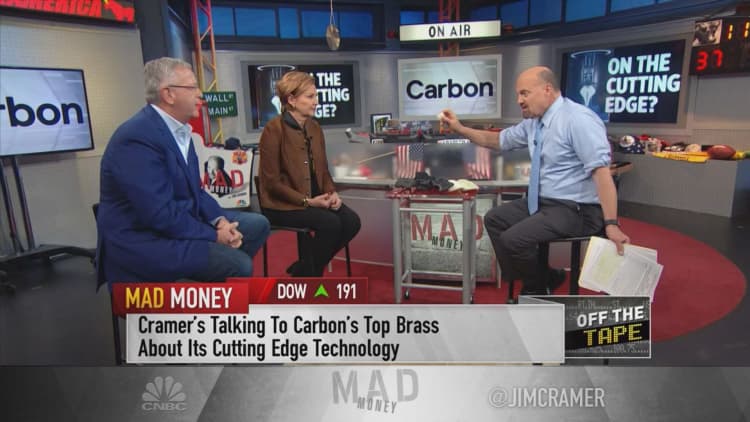There is a subscription for everything, some say. Of course, they don't mean it literally. They're just trying to prove a point about how expansive the subscription economy has become.
It has even reached the world of 3D printing, thanks to $2.5 billion start-up Carbon.
"We have the world's first piece of manufacturing hardware ever to go out via subscription model so it's infinitely upgrade-able," co-founder and executive chairman Joseph DeSimone told CNBC's Jim Cramer on Monday.
Carbon's printers, DeSimone explained on "Mad Money," are "a really important part to future-proof people from obsolesce."
Based in Redwood City, California, Carbon was founded in 2013 and received a reputation boost in 2015, when DeSimone delivered a TED talk on the technological innovations Carbon was pursuing.
Privately held Carbon was further elevated last week, when former DuPont Chairman and CEO Ellen Kullman took over as CEO. She had been on its board since 2016.
Carbon already has partnerships with a litany of notable brands, from Adidas to Ford to Ikea, and its chief innovation in 3D printing technology is a process called Digital Light Synthesis.
It uses light and heat to transform a pool of liquid resin into an actual product, Cramer noted, which allows the company to manufacture finished products at mass scale.
The difficulties of standard 3D printing to create scale has held back the technology that, at one time, people believed would be widespread in homes.
"This has been an area that's been around for 25, 30 years, but it's been a prototyping technology," DeSimone said. "We've cracked the code on how to do 3D printing 100 to 1,000 times faster."
Indeed, it is the transformative potential of Carbon that convinced Kullman to initially join its board, then become chief executive and president.
In all her years of manufacturing experience, Kullman said in the same "Mad Money" segment that she felt "this technology could really be a bridge to a digital manufacturing platform and do so at a scale and a cost that was relevant in manufacturing."
Some of Carbon's other business partners include Johnson & Johnson, with which Carbon is developing a "digitally printed material that serves a mechanical function in the body, but after a few months it's fully bio-absorbed and transitions to your own tissue," DeSimone said.
He said it is "on its way" to receiving regulatory approval, adding that it could be used in post-surgery situations as well as linking nerves back together.
Carbon also is working with Lamborghini as part of its foray into the automotive industry. It has created parts for the luxury sports car maker, just as it has for Ford.
"We have the very first 3D-printed parts ever on a production vehicle out of Detroit," DeSimone said, noting Carbon has parts on the Ford Mustang and Ford F-150 truck.
As for whether Carbon, which has raised at least $260 million in venture funding, would go public, Kullman said, "I think the fun is going to be in building it out."
"Those decisions are down the road," she said.

Questions for Cramer?
Call Cramer: 1-800-743-CNBC
Want to take a deep dive into Cramer's world? Hit him up!
Mad Money Twitter - Jim Cramer Twitter - Facebook - Instagram
Questions, comments, suggestions for the "Mad Money" website? madcap@cnbc.com



